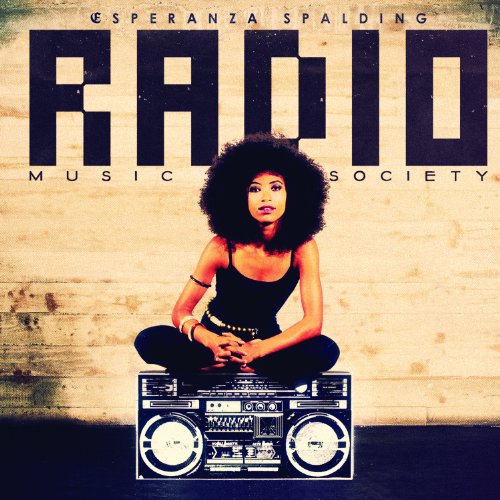
Esperanza Spalding
Radio Music Society
Release Date: Mar 20, 2012
Genre(s): Jazz, Contemporary Jazz, Jazz-Pop
Record label: Concord
Music Critic Score
How the Music Critic Score works
Buy Radio Music Society from Amazon
Album Review: Radio Music Society by Esperanza Spalding
Great, Based on 8 Critics
Based on rating 5/5
Like Pam Grier with a stand-up bass in place of a sawed-off shotgun, this jazz fusionista earned the baff led admiration of millions when she snatched the 2011 Best New Artist Grammy away from Justin Bieber. A dazzling player skilled at butterfly-zoo arrangements, the 27-year-old steps toward pop here, echoing Stevie Wonder and Aja-era Steely Dan. Despite a charmingly lithe voice, her song writing has a way to go; high points are covers (Wonder’s "I Can’t Help It") and some groove enhanced Q-Tip co-productions.
Based on rating 4/5
This ambitious new album from the Grammy-winning singer and bassist Esperanza Spalding is star-packed (Q-Tip, Joe Lovano, Jack DeJohnette and Billy Hart, Lionel Loueke, Gretchen Parlato). Spalding's charisma, whimsical poetry and enthusiasm for jamming still run through the heavily produced set. Horns and organ wrap around Spalding's R&B vocal on Black Gold; misty classical string sounds ease in the gently funky Cinnamon Tree; Wayne Shorter's Endangered Species is remade in the spirit of Shorter's own version and from a jazz perspective Spalding never loses touch with.
Based on rating 4/5
At first it sounds like someone idly spinning a radio dial – a random kaleidoscope of musical bits and pieces. But gradually it comes together as an artful collage, in which pop, funk and soul are held in balance by the subtle presence of jazz. Among those taking part are saxophonist Joe Lovano and veteran drummer Billy Hart. Sometimes, as in a version of Wayne Shorter's "Endangered Species", there's too much to take in, but mostly it's just fascinating.
Based on rating B
On her first release since swiping last year’s Best New Artist Grammy from poor, defenseless Justin Bieber, the singer-bassist sounds eager for a pop crossover — check out her funky take on Michael Jackson’s ”I Can’t Help It,” and ”City of Roses,” a soulful pair-up with Q-Tip. But Radio Music Society is no dumb-down job: Closer ”Smile Like That” finds her brandishing sour notes (and revered sideman Jack DeJohnette on the drums) with jazz-nerd verve. B Best Tracks:Lustrous lead single Black GoldHorn-enriched Radio Song .
Based on rating 7/10
Esperanza Spalding's fourth album, Radio Music Society (a companion piece to Chamber Music Society in name only) is one of enormous ambition -- polished production, sophisticated, busy charts, and classy songwriting -- that consciously juxtaposes neo-soul and adult-oriented jazz-tinged pop. It employs a stellar cast, largely of jazz musicians, to pull it off. She produced the set, with help from Q-Tip on a couple of numbers, and wrote all but two songs here: a cover of "I Can't Help It" (a Michael Jackson cover written by Stevie Wonder) and Wayne Shorter's "Endangered Species.
Based on rating 3.0/5
The title of Esperanza Spalding’s fourth album, Radio Music Society, may suggest that it’s the Grammy-endorsed jazz singer’s bid for pop-crossover success, but Spalding’s music is still a hard sell. Contemporary jazz remains a fairly small niche market, and Spalding, whose musical influences include both hip-hop and traditional blues, may be better equipped than most of her peers to appeal to the masses—or, at the very least, the coffeehouse demo. But while there’s an undeniable polish to Radio Music Society, and some of the songs flirt with more conventional pop structures, the frequent improvisational asides and amelodic runs keep the album from being readily accessible.
Opinion: Very Good
The young bassist-vocalist follows her 2011 Grammy win with a fine fourth album. Kevin Le Gendre 2012 After the breakthrough of 2010’s Chamber Music Society, the album which saw bassist-vocalist Esperanza Spalding grab a Best New Artist Grammy as Justin Bieber’s publicists wondered, “Who’s she?” comes the tricky business of, “What’s next?” Jazz snobs might already be turning up noses and closing down ears at a musician tainted by mainstream accolades, but Spalding was touring with saxophone colossus Joe Lovano a few months after waltzing off with the headline-making statuette. So everybody would do well to avoid a rush to premature judgment.
Opinion: Very Good
Last year, when Esperanza Spalding became the first jazz musician to win the Best New Artist Grammy – beating out Justin Bieber to the outrage of a nation of Beliebers – she catapulted from the obscurity of her genre to the international stage. The part-time Austinite and full-time bassist follows up that upset with fourth disc Radio Music Society, which follows 2010's Chamber Music Society and finds her moving away from Latin and South American sounds toward a groove-oriented (and political) vision of contemporary jazz. The scathing "Land of the Free" takes on racism and wrongful imprisonment, ending abruptly with a clank of prison doors, while "Black Gold" is a smooth-jazz pep talk for black youth.
'Radio Music Society'
is available now

